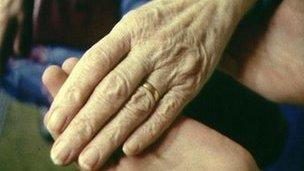Dementia diagnosis rates: 'Shockingly low'
- Published

Rates of dementia are steadily increasing with an ageing population
The NHS in England has been told to push for a rapid rise in dementia diagnosis rates, so that by 2015, two out of three cases are identified.
Currently fewer than half of people with dementia have a diagnosis.
A senior adviser on public health says dementia cases could be halved if more were done on prevention.
He wants wide-scale mental agility testing to identify people at risk, but critics say that would cause unnecessary fear and anxiety.
The government says the overall dementia diagnosis rate in England - about 45% - is "shockingly low". The issue was raised as a priority a year ago in the prime minister's "challenge on dementia".
This set out a programme to improve care, promote public support and understanding of dementia, and encourage research.
Now, in a progress report, NHS England says diagnosis rates should rise by more than 20% over the next two years, so two out of three cases are detected.
This would bring overall diagnosis rates in England into line with those in Northern Ireland and Scotland.
Focus on prevention
The announcement coincides with a call for a greater emphasis on dementia prevention from Dr Charles Alessi. He is chairman of the National Association of Primary Care and an adviser for Public Health England.
It is estimated that 670,000 people in England have dementia. That figure is expected to double in the next 30 years. But Dr Alessi says the number of cases could be halved by focussing on the risks for vascular dementia - caused by reduced blood flow to the brain.
He says a simple mental agility assessment should become part of the range of tests routinely provided in the NHS Health Check after people reach 40. He argues the Montreal Cognitive Assessment (MoCa) could even be used online to allow people to make their own assessment.
As well as checking for memory this test looks at "executive function" - the ability to do everyday activities such as organising, planning and making decisions. Dr Alessi says it provides a good indicator of early cognitive impairment.
He says people who know they are at risk of vascular dementia can act to help delay or even prevent symptoms if they eat well, take exercise and don't smoke. He emphasises the importance of controlling blood pressure and diabetes - also risk factors for heart attacks, strokes and kidney disease.
"This condition - which we thought was hopeless, and all we could offer was more dignity and respect and more treatment which is very important - can also be delayed. That is amazing. We can influence this so I think we should."
'Snapshot'
The National Clinical Director for Dementia in England, Prof Alistair Burns, says the MoCa test could be an important component in identifying risk of vascular dementia, but he says by itself it is just a "snapshot", and a lot of other factors should be brought to bear in arriving at a diagnosis.
"It's not just one thing. It's looking at the history of the person, it's looking at how they are doing in general, it's looking at the medical history, at brain scans, and that test of cognition, of executive function."
However he says the message about the possibility of prevention is important.
Dr Chris Fox, an expert in old age psychiatry at the University of East Anglia, says he is very concerned at the idea of people being encouraged to carry out their own cognitive assessments. He says the idea is not supported by the evidence.
'Unnecessary anxiety'
"My biggest concern is the impact on patients, creating unnecessary anxiety. I'm also very concerned about the pressure it puts on health and social care with resources being pulled around. We need to spend our health budget in an evidence-based way even more than we used to."
He says investing in research about the early stages of dementia my be a "more fruitful" use of funding.
Jeremy Hunt MP: "We are not advocating screening"
The prime minister has announced the UK will use its presidency of the G8 group of leading industrialised countries to a encourage new international approach on dementia research. This will include a summit, to be held in London in September, which will bring together health and science ministers and leading dementia experts.
In a statement Mr Cameron said he wanted to get the "brightest minds" working together on this:
"I've said before that we need an all-out fight-back against dementia that cuts across society. Now we need to cut across borders and spearhead an international approach that could really make a difference."
- Published12 May 2013
- Published15 January 2013